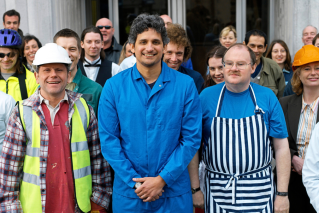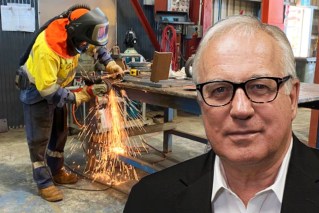Small business turns to overseas outsourcing
“Originally it was very taboo, it was something that was not really spoken a lot about and a lot of clients wouldn’t accept that it was happening.”
That’s Justin Flavel, who runs an accounting and professional services firm, speaking about outsourcing.
He employs the equivalent of 11 full time workers at his Subiaco practice and the equivalent of one full time staff member in India.
Mr Favel has found several benefits from outsourcing.
“The benefits are allowing us to gain more efficiency and productivity, and allowing us to add additional financial services or advisory services to our clients at no cost.
“[And it] allows our accountants to become advisers as opposed to bookkeepers or number crunchers.”
In a completely different industry, builder Mark Hughes has just tried outsourcing for the first time.
“We were just looking to free up some of our internal time,” he said.
“[Outsourcing] helps with the take off materials such as brickwork, concrete, rendering, tiling that sort of stuff which ties us up internally for quite a few hours with the day to day running of the business.
“What they can probably do in five or six hours overseas would probably take us three or four days in total to put together and obviously our time is probably better spent on other aspects of the business such as dealing with customers and getting that side of things right.”
Mr Hughes only thought to try outsourcing after it was recommended to him by another small business owner who’d had success with it.
He placed an advertisement on an international freelancing website and sent the building specifications to a quantity surveyor in Pakistan who then determined the quantities of the various building materials needed for a particular house design.
Mr Hughes says he had already done the calculations himself in order to be able to verify the accuracy of the work, and despite a few teething problems he was pleased with the result.
“I think the language barrier was one issue,” he said.
“The people that we use are available on Skype but the first instance is on email so just with the language difference… although English is the first language for us, for them it’s not quite the same.
“Outside of that overcoming the teething problems has been successful so even though we’re at the early stages I definitely think we’ll continue using it.”
Mark Hughes expects he will save about $30,000 a year by outsourcing, money he will invest back into the business.
“It’s like any relationship; you’re working to understanding how they work.
“So [in the past] if we took somebody new on or went to a sub-contractor we may in theory have had similar issues.
“And they weren’t big issues it’s just getting to understand how they work and how we work and that’s what we want to do.
Gavan Forster from the Master Builders Associations says he is not surprised companies are beginning to outsource estimating work.
“The industry is a very competitive one and builders are always looking for an edge,” he said.
“This move to offshore processing of building plans through their estimating we’ve seen it already happen in the past with design.”
Mr Forster says the work is often carried out by people who have previously studied in Australia and are therefore experienced with Australian building codes and standards.
“So the fact that now they go home and then can offer that service to Australian builders that can only be a good thing for people who are looking to build a new home and keep them as cheap and affordable as possible.”
Mr Forster believes any risk is minimal.
“Like using overseas-based products the builders have to be comfortable that they comply with all Australian standards and under this scenario where estimating and so on is a very mechanical process really in this global age that sort of task can be done anywhere whether it be done in Western Australia or whether it be done overseas.
“As long as it complies with the Australian requirements then we see no problem with that.”
The West Australian Chamber of Commerce and Industry expects more small businesses will adopt outsourcing practices.
Chief economist John Nicolaou says the trend will continue until governments reform business policies.
“Businesses have to look at their costs each and every day to ensure they can survive,” he said.
“The last thing we want to see is small business survival rates plunge to lower levels because the cost base hasn’t been able to be adjusted to allow them to survive, prosper and grow over time.
“The challenge for government at all levels is to help address those cost challenges facing business and put in those practical solutions over the longer term that will ensure small business will remain the lifeblood of the economy.
Mr Nicolaou says those solutions could be in a number of forms.
“First and foremost is payroll tax, which is a tax on jobs.
“To the extent to which the government can look to lift the threshold progressively over time to help protect small businesses from incurring this tax on jobs then that’s undoubtedly a good outcome for small business.
“Beyond that we need to look at broader reform measures particularly around regulation and red tape.”
For small businesses considering outsourcing, Justin Favel has this advice.
“Definitely look at it; there’s obviously security concerns, there’s a multitude of concerns that you need to become comfortable with.
“You also need to be comfortable that your clients are aware of what you’re doing but if you can gain the efficiencies and generate the productivity out of it then I can’t see any reason why you shouldn’t be doing it.”








